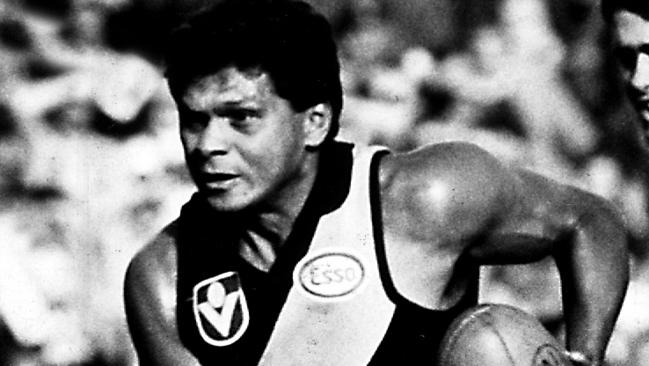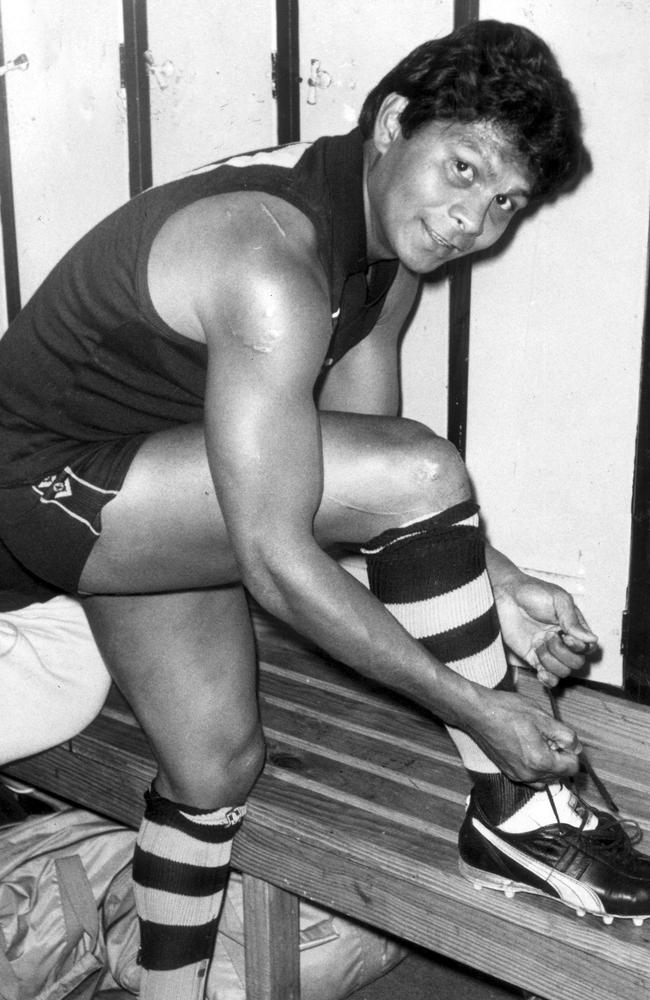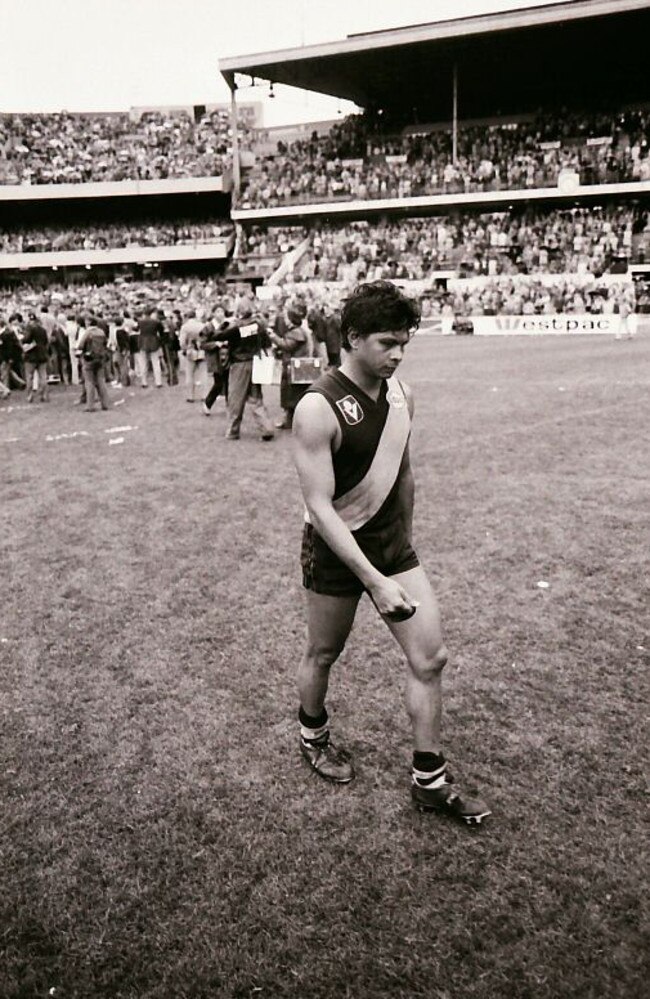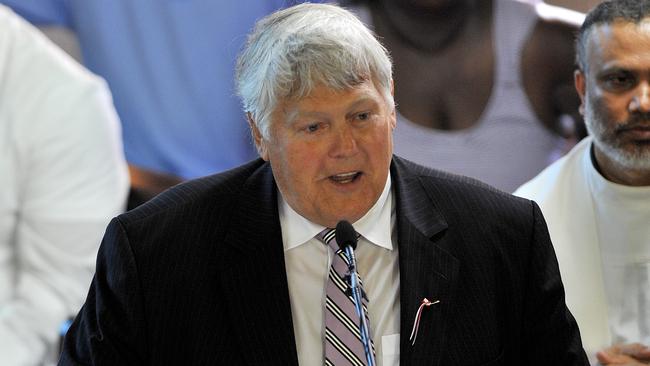AFL Hall of Fame 2016 ceremony: Richmond champion Maurice Rioli joins Australian football elite
FITTINGLY, in the month the man who danced like a butterfly passed into eternal greatness, Maurice Rioli is being recognised for his wonderful deeds.

Richmond
Don't miss out on the headlines from Richmond. Followed categories will be added to My News.
FITTINGLY, in the month the man who floated like a butterfly passed into eternal greatness, Maurice Rioli is being recognised for his wonderful deeds.
“It was his feet,’’ Tigers teammate Dale Weightman said of Rioli.
“He had great feet ... boomp, boomp, boomp, boomp, boomp. He’d move his feet and blokes would be going here, going there, going here.
“He could dance, Maurice. He’d move sideways, backwards, forwards in a five metre arc ... it was unbelievable.’’
There is a sense of mythology about Rioli.
Don’t misinterpret that as myth, for Rioli was a heck of a player. Think a more sturdy Cyril — Maurice’s nephew — thicker in the midriff, a touch slower. But they’re the only negatives.
OTHER 2016 AFL HALL OF FAME INDUCTEES:
ST KILDA FULL-BACK VERDUN HOWELL JOINS ELITE GROUP
UNDERRATED LION NIGEL LAPPING GETS JUST RECOGNITION
He could dazzle, and dance, and tackle, and make fools of the opposition players as they went to grasp the body and could only catch air.
Rioli played 168 games for South Fremantle in two stints, separated by six seasons at Richmond from 1982 to 1987.
His skill level was elite and his defensive capabilities were out of this world for early 1980s midfielders.

Dermott Brereton believes Rioli to be the best tackler he has seen.
Mal Brown, who coached Rioli at South Fremantle, agreed. He’d seen it hundreds of times, players thinking they could take Rioli on, only for Rioli to drag them to ground, like a startled calf at a rodeo event.
“He was a brilliant tackler,” Brown said. “I don’t think I’ve seen anyone better defensively at taking the ball off other players, maybe Cyril, but I think he even was better than Cyril.
“And of all the times I saw Maurice play, I cannot recall him being caught holding the ball. How’s that?”
Weightman recalled the day Rioli told his teammates he would tackle as if he was a gunslinger drawing two Colt 45s from the holsters.
“Every time he tackled he would draw from the hips,” Weightman said. “He didn’t go up high, he was a gunfighter, go from his hips.”
Of course, Rioli was far more than a tackler.
A prodigious talent at South Fremantle, Brown pointed him — with bias — to Richmond for the 1982 season.

So keen to get him to Tigerland, Brown and a WA businessman paid the transfer fee, which was about $7000, a huge amount at the time.
One of the first games of ‘82 was a pre-season game in Swan Hill, in 40C-plus degrees.
“It was unbelievable,” Weightman said. “Blokes were dying, having cold showers at halftime, and Maurice just destroyed Carlton. He had the ball on a string. He tackled every Carlton bloke and they couldn’t catch him, and I thought to myself this bloke might be all right.”
Another teammate, Kevin Bartlett, remembers the practice game, but can’t recall Rioli.
Perhaps KB was delirious in the heat. “At halftime, we were sitting in the showers with our gear on. It was stifling, you couldn’t even breathe.”
It says plenty about Rioli’s mental toughness.
“He was a fantastic player,” Bartlett said. “So evasive, had the zigzag, was a beautiful kick, was clever, everything we see in Cyril.”
Weightman: ‘”He was a natural. He made everything look simple. Whether he tackled someone, and no one could tackle him, he didn’t fall over, and when he got the footy he knew what he was doing. You knew something was going to happen.
“Like a lot of indigenous players, the footy was part of their hands. He didn’t say much. And when he did say something, we thought, `Maurice is speaking, we better listen’.”
He was a dancer and, when required, a fighter.
He confronted racism in two ways — turn away or a turn a fist.
“He never took any s---,’’ Weightman said. “Anyone who gave him a little bit of cheek, and in those days they used to about his colour, he used to whack them, don’t worry about that. You’d see blokes come out of the pack and you’d think, Maurice just clipped you. He was just so quick.”

It’s fair to say Brown, who is known to be volatile, once with his fists, occasionally with his tongue, had an incredible warmth for Rioli.
“He was as tough as nails and was a big-game player,” he said. “He played well for WA, played well in finals at South Fremantle, actually South lost a Grand Final (1981) because he got a cramp at the 10th minute of the last quarter.”
What a wonderful reputation to have: A big-game player.
Rioli won the Simpson Medal for best afield in the 1980 and 1981 Grand Finals for South Fremantle and the Norm Smith Medal for Richmond in the losing 1982 Grand Final.
Three successive grand finals for three successive best on grounds. It’s extraordinary when you think about it.
Rioli, who was an ALP member of parliament in the NT from 1992-2001, died on Christmas Day 2010. Brown was invited to speak at the funeral in Darwin.
He remembers a time of reflection later that night at the wake, which was accompanied with, he said, his first ever glass of scotch.
“He was a wonderful person, Maurice. You know, you could shout at him, you could kiss him, you could kick him in the bum or you cuddle him, and he would react the same.”
The feeling was strong, when talking to Brown, that he would’ve loved to have been there last night for the occasion.
His memories of a young man from Melville Island, who he brought to South Fremantle, moved to Richmond, and who was the same young man who would become a leader, both spiritual and real, for generations of young indigenous footballers, will live forever.
In some ways, as a pioneer, so will Maurice Rioli.
Originally published as AFL Hall of Fame 2016 ceremony: Richmond champion Maurice Rioli joins Australian football elite





